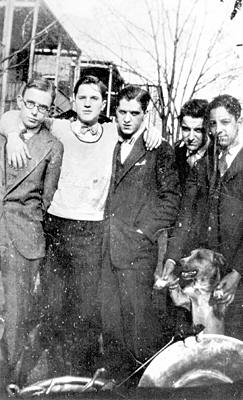First-hand stories—scenes and
snapshots—from the lives of the
people who created jazz.
Chicago 1924 - Excerpt from
Bandleader Eddie Condon's
Autobiography
We Called It Music, 1948 London, Peter Davis

Eddie Condon in 1926 from 1920-1950, Black Beauty, White Heat, A Pictorial History of Classic Jazz by Frank Driggs and Harris Lewine (1996, Da Capo Press)
"The Cascades was a moderate-sized upstairs place, bring your own bottles and buy set-ups. A good-looking kid was trying to get notes from a tenor saxophone which was green with corrosion. It sounded the way it looked. A blond solidly built boy was watching him. He had a cornet. I introduced myself; the saxophone player shook hands with me. ‘My name is Bud Freeman and this is Jimmy McPartland.’ We sat down and began to play. Freeman seemed to know only one tune; everything sounded vaguely like "China Boy." MacPartland had a strong, rugged tone; he knew where he was going and enjoyed the journey.

The Austin High Gang, Chicago 1923. Left to Right: Frank Teschemacher, Jimmy McPartland, Dick McPartland, Bud Freeman, and Arny Freeman in the Freeman's back yard. Courtesy of the McPartland collection, Chicago Jazz Archive.
“Between sets we gabbed. MacPartland and Freeman talked about jazz as if it were a new religion... When MacPartland mentioned King Oliver, smoke came out of his eyes. ‘He’s playing a fraternity dance at the Chez Paree tonight,' he said. 'Let’s go down there after we finish.’ We arrived in time for the last set. Oliver lifted his horn and the first blast of "Canal Street Blues" hit me. Everyone was playing what he wanted to play and it was all mixed together as if someone had planned it with a set of micrometer calipers; notes I had never heard were peeling off the edges and dropping through the middle; there was a tone from the trumpets like warm rain on a cold day. We were immobilized. The music poured into us like daylight running down a dark hole. The choruses rolled on like high tide, getting wilder and more wonderful. Armstrong seemed able to hear what Oliver was improvising and reproduce it himself at the same time. It seemed impossible so I dismissed, it but it was true. When they finished, MacPartland said, ‘How do you like it?’ There was only one thing to say, ‘It doesn’t bother me.'"

